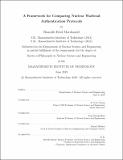| dc.contributor.advisor | R. Scott Kemp. | en_US |
| dc.contributor.author | Macdonald, Ruaridh(Ruaridh R.) | en_US |
| dc.contributor.other | Massachusetts Institute of Technology. Department of Nuclear Science and Engineering. | en_US |
| dc.date.accessioned | 2020-01-08T19:35:27Z | |
| dc.date.available | 2020-01-08T19:35:27Z | |
| dc.date.copyright | 2019 | en_US |
| dc.date.issued | 2019 | en_US |
| dc.identifier.uri | https://hdl.handle.net/1721.1/123368 | |
| dc.description | This electronic version was submitted by the student author. The certified thesis is available in the Institute Archives and Special Collections. | en_US |
| dc.description | Thesis: Ph. D., Massachusetts Institute of Technology, Department of Nuclear Science and Engineering, 2019 | en_US |
| dc.description | Cataloged from student-submitted PDF version of thesis. | en_US |
| dc.description | Includes bibliographical references (pages 173-179). | en_US |
| dc.description.abstract | Even with the end of the Cold War, nuclear arms control continues to be a cornerstone of strategic stability and international non-proliferation efforts. New treaties are necessary to build upon, or at least maintain, the status-quo, and will rely upon verification technologies and protocols to ensure all sides are dismantling their warheads as promised. The nuclear weapon states refuse to participate in any process which might reveal the design of their warheads to an adversary or would-be proliferator. This makes warhead authentication, the critical verification step where the object to be dismantled is confirmed to be an authentic warhead, especially challenging. Despite several decades of research, there is no agreed means of describing or assessing warhead authentication protocols. This has hindered protocol development, and made it more difficult for the policy and technical communities to communicate what is important and feasible. | en_US |
| dc.description.abstract | This thesis presents a framework for describing warhead authentication protocols and quantifying their performance. The framework draws on methods used to assess digital authentication protocols, as well as information theoretic analysis of privacy. A model is developed for describing authentication protocols; showing how authentication questions, physical properties, and measurable data relate to one another. This allows the objectives and assumptions of a protocol to be made explicit, helping to ensure that protocols are compared fairly. It was found that the protocols in the literature have made use of very different assumptions, and that has influenced their choices of measurement technology and concepts of operation. Having established how to describe protocols, the thesis investigates how best to quantify the completeness (type I error rate), soundness (type II error rate), and information privacy of a protocol. | en_US |
| dc.description.abstract | While the absolute soundness cannot be calculated without knowledge of all possible hoaxes, a conditional soundness can be estimated using a minimax approach. A new measure of information privacy is presented, based on a change in the KL divergence between an inspector's beliefs and the actual warhead design, when the inspector starts from an incorrect prior. | en_US |
| dc.description.statementofresponsibility | by Ruaridh Reid Macdonald. | en_US |
| dc.format.extent | 179 pages | en_US |
| dc.language.iso | eng | en_US |
| dc.publisher | Massachusetts Institute of Technology | en_US |
| dc.rights | MIT theses are protected by copyright. They may be viewed, downloaded, or printed from this source but further reproduction or distribution in any format is prohibited without written permission. | en_US |
| dc.rights.uri | http://dspace.mit.edu/handle/1721.1/7582 | en_US |
| dc.subject | Nuclear Science and Engineering. | en_US |
| dc.title | A framework for comparing nuclear warhead authentication protocols | en_US |
| dc.type | Thesis | en_US |
| dc.description.degree | Ph. D. | en_US |
| dc.contributor.department | Massachusetts Institute of Technology. Department of Nuclear Science and Engineering | en_US |
| dc.identifier.oclc | 1134982507 | en_US |
| dc.description.collection | Ph.D. Massachusetts Institute of Technology, Department of Nuclear Science and Engineering | en_US |
| dspace.imported | 2020-01-08T19:35:22Z | en_US |
| mit.thesis.degree | Doctoral | en_US |
| mit.thesis.department | NucEng | en_US |
